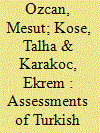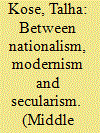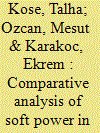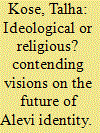|
|
|
Sort Order |
|
|
|
Items / Page
|
|
|
|
|
|
|
| Srl | Item |
| 1 |
ID:
139254


|
|
|
|
|
| Summary/Abstract |
Using original public-opinion polls and elite interviews conducted in 2012, this article analyzes the perceptions of Turkish foreign policy regarding the Arab Uprisings and the Syrian conflict in three Middle Eastern countries, Egypt, Iraq and Iran. It finds that ethnic, sectarian and religious groups in these three countries vary significantly in their views on Turkish foreign policy regarding both the Arab Uprisings and the Syrian conflict, although the same identity-related factors have a less salient effect at the elite level. The findings also suggest that the intersection of ethnicity and sect shapes people's attitudes toward Turkish foreign policy in Iran and Iraq. Sunnis, except for Kurds in Iran and Iraq, tend to have a positive view of Turkish foreign policy, while Shia Turkomans in Iraq tend to have a negative one.
|
|
|
|
|
|
|
|
|
|
|
|
|
|
|
|
| 2 |
ID:
122050


|
|
|
|
|
| Publication |
2013.
|
| Summary/Abstract |
This study discusses the position of Alevi identity and Alevi community with regard to the Turkish national identity-building project. There was a partial compatibility between the Kemalist objective of laicization and nation building and the Alevi practice and understanding of a 'local' version of 'Turkish Islam'. Besides these compatibilities, Alevis faced the challenges of nation-building and homogenization policies, which involved homogenization in ethnic, religious and sectarian domains. Kurmanji- and Zazaki-speaking ethnically Kurdish/Zaza Alevis of Eastern Anatolia had a different experience during the project of centralization and ethnic homogenization, in comparison to Turkish-speaking Turcoman Alevis. This different experience still is a source of division among Alevi communities.
|
|
|
|
|
|
|
|
|
|
|
|
|
|
|
|
| 3 |
ID:
146344


|
|
|
|
|
| Summary/Abstract |
This study explores the relationship between ethnic, sectarian, and religious identities and soft power in the Middle East and North Africa (MENA) region in the immediate aftermath of the Arab Uprisings. Utilizing original public opinion surveys conducted in Egypt and Iraq in 2012, we find that identity-based allegiances play a major role in groups’ choices regarding which countries’ increasing involvement in the region are seen favorably and which countries are seen as an ideal model for the region. Sunnis are likely to view Turkey and Saudi Arabia positively in both regards, whereas Shiites are more supportive of Iran. But our results also suggest that crosscutting cleavages should not be overlooked: Sunni Kurds are less likely to hold positive attitudes toward Turkey and Saudi Arabia. Our findings also show that Copts, a religious minority in Egypt, hold positive attitudes toward the United States and negative ones toward Saudi Arabia and Iran. These findings contribute to both the theoretical literature on soft power and the debates on international competition for influence in the MENA region by emphasizing the role of ethnic and religious identities in shaping attitudes toward international actors.
|
|
|
|
|
|
|
|
|
|
|
|
|
|
|
|
| 4 |
ID:
116590


|
|
|
|
|
| Publication |
2012.
|
| Summary/Abstract |
Establishing a coherent collective identity within the modern urban context among people who have different ideological, social and religious orientations, and social and economic backgrounds, is an ongoing struggle within the Alevi community in Turkey. This study tries to understand how alternative positions on Alevi identity dynamically construct the boundaries, moral contents and the new shape of Alevi identity in modern urban contexts through use of various discursive resources. At least two main contending 'positions' on Alevi identity try to institutionalise Alevi identity in modern urban contexts, which are 'Ideological Position' and 'Religious Position'. Those discourse positions constitute different visions about the past and the future of the Alevi community as well as the cultural and the political boundaries of Alevi identity. More importantly, those positions resonate in ordinary citizens' life stories as well as group narratives. This study utilises the analytical frame of 'positioning theory' to shed light on the complexities of identity negotiation.
|
|
|
|
|
|
|
|
|
|
|
|
|
|
|
|
|
|
|
|
|